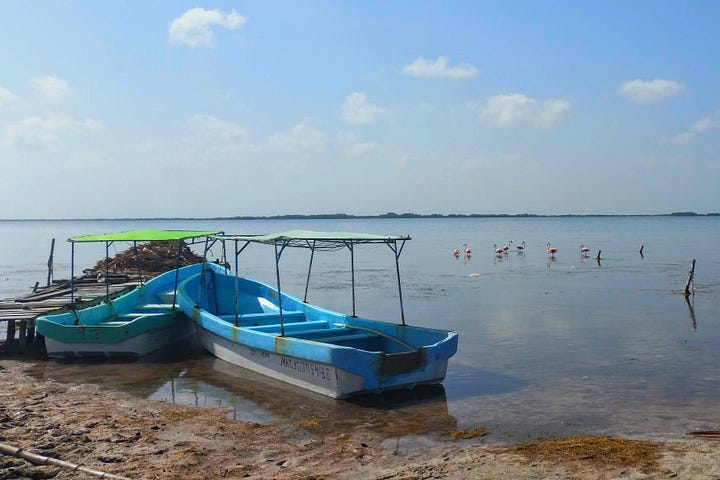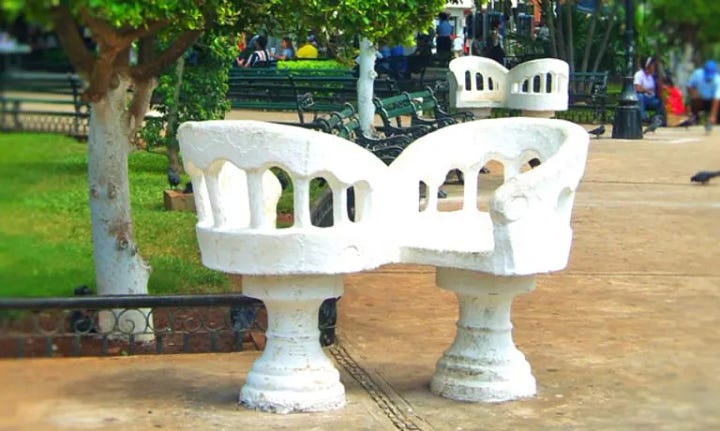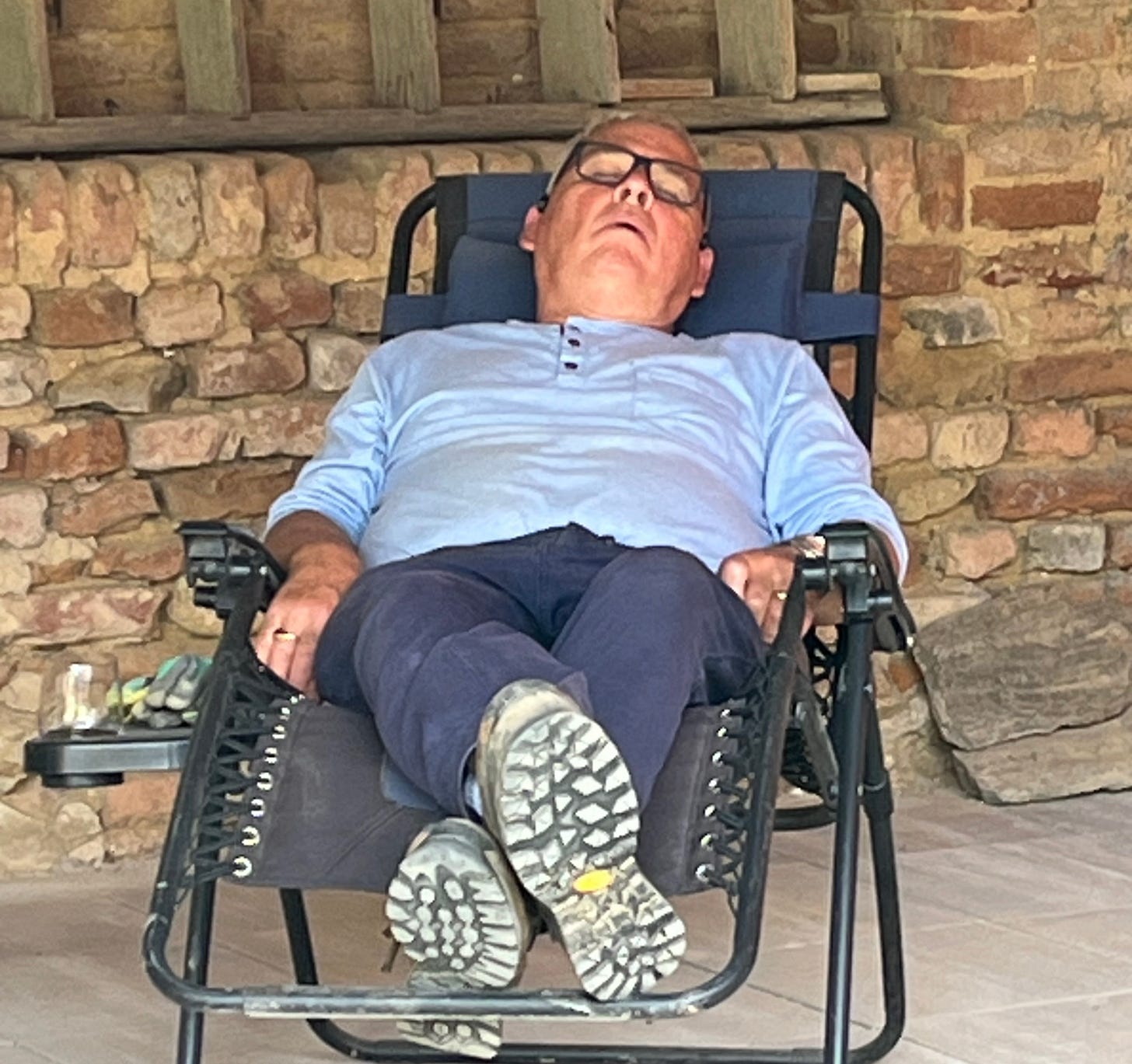Slow down, you move too fast.
Yes, it really is ok to linger long over a meal, take naps, or do not much at all.
KRIS: Another lovely day here in the Piedmont. Nothing planned….which is the kind of day I love. Think I will stay here in my PJ’s and robe this morning and enjoy a second cup of coffee.
ANN: I’m doing the same! Because of the heat this time of year I stay garbed in a light housedress and flip flops. Or a sarong. The goal is to have enough clothing on or handy in case someone comes to the door.
We’ve been having some heavy conversations in these crazy times. Conversations that needed to be had. But there are reasons we chose to live in Mexico and Italy, and I’m guessing for you, too, it has to do with a slower pace? Just the thought that I can structure my day as I want is heaven to me.
KRIS: Oh, yeah. I was looking for a slower pace of life and you can find it just about anywhere outside the US, it seems to me. Many years ago my husband, our daughter and I lived in Tanzania while he was on a Fulbright there. Talk about a different way of doing time! It was a culture shock for us. In African time, things happen when they happen. The concepts of punctuality, scheduling, multitasking, and timeline are practically nonexistent there. We got into the rhythm of a slower, less predictable life and vowed we would not go back into the frenzied rat race that is the American way when we returned.
ANN: Mexico to a lesser degree is like that. Time is elastic and subject to the whims of whatever universal forces are at play. Cars break down, children get sick, it’s too damn hot out, something broke, on and on, basically life happening. Once I let go of my American rigidity and went with the flow, it felt good. In fact, now on my trips to the US I feel stressed and pressured to be organized and have my plans made well in advance. No me gusta.
Sidenote: As I write this, Luis is here doing my biweekly pool cleaning. Turns out his extension cord failed, so it took him longer and then we spent another 10 minutes discussing where in my area he could buy another one. So his day has screwed up. Asi es la vida.
KRIS: Alas, within a matter of only a few weeks after leaving Tanzania we were sucked back into the frantic pace of life in the US. As one of our Tanzanian colleagues commented, “oh, you are from America where there are so many decisions about nothing.”
ANN: That’s so true. We had a Mongolian scholar come to the university when I was there. She told me she literally froze in the grocery store, overwhelmed with the zillions of options for everything.
KRIS: Don’t get me wrong, Ann. People around the world work very hard. So it isn’t the case that cultures outside America are havens for lazy, unmotivated individuals. Not going to see people frittering away the days and partying all night, as is the stereotype of slower paced nations. Maybe it is best summed up by the phrase, “some people live to work, while others work to live.” Too many Americans fit the live to work profile.
ANN: Oh that old trope about laziness. Here they work hard, too hard. There is a movement underway now for the federal government to sanction a 40 hour work week, but who knows if that will happen. But when it’s vacation time here, it’s time to relax and enjoy! For us Americans, getting a taste of an equitable work-life balance like that of both Mexico and Italy is an eye-opener. And I can’t go back.
KRIS: One of the hardest things for me to adjust to here in Italy about the pace of life is the mid-day pause. Shops and services all close from about 12:30 to 3:30. Kids come home from school for lunch, as do most workers. Those of us who are lucky enough to be retired find it a little annoying to have everything closed down for the afternoon, I suppose. Although I think many retirees here in Italy are feeding their grandkids during the lunch break time. At least that’s what I observe in my neighborhood.
ANN: Our city is booming and the mid-day pause isn’t a thing for many places now. But if you are doing errands to government offices or want lunch, best to check hours. The mercados and local cocinas are closed by 2 pm. The schools break for lunch and kids go home. I also see little kids with their abuelas during that time. It would be difficult to be a working mom here, you are constantly shuttling kids around. The elders here very often pitch in.
Back to us and our pj’s and coffee. What’s an average slower day look like to you in Italy?
KRIS: I am not a morning person, as you may recall, Ann. So I generally roll out of bed about 8 a.m. and have my morning espresso while I sit in my PJ’s and do my Wordle and other word games. Then on to morning household chores like doing a load of laundry, watering the window boxes or garden flowers, and contemplating what to make for dinner.


ANN: This is exactly how I roll on a day without major commitments. Because of the heat this time of year, I do generally get up much earlier. But my pace is very slow. I am not a morning talker. But my brain seems to work better in the mornings. So lots of contemplating about all kinds of things while I putter around, and the most productive time to write. These mornings the local parrots have been visiting. I hear them squawking in the trees but rarely see them. Trying to catch a glimpse of them is part of my morning ritual now.
KRIS: Quite a few mornings I walk to the public market for whatever menu items I need for the evening’s dinner. Maybe I grab another espresso on the walk back home with the groceries. Eat a light lunch at home. Sometimes I work on a sewing or knitting project, listen to an audiobook, read the news, do some writing, etc. In the extreme heat of the summer months I must confess that I often take an hour for a nap, or a pennichella as they say here in the Piedmont. This is a very common practice and one that I have come to fully endorse. Is the siesta a real deal in the Yucatan too?
ANN: I think now people do their siestas on weekends or on their way back and forth to work. I always see people sleeping on the bus. Sometimes I see workers dozing on the sidewalk under a shade tree for a brief rest after lunch. I’ve always been a napper, more than you, I remember. It’s so brutally hot this time of year that everyone who can be is inside in the afternoons. My heat survival regimen includes a good nap in my hammock under the AC. Yes, with the TV on, an old movie or whatever. The dog lays next to me on the cool tile. It’s some of the deepest sleep both of us get.
KRIS: My typical evening is spent cooking dinner, often with help from housemate Linda or husband Rick. Italians eat much later than Americans, so we often have dinner about 7:30 or 8:00, which is actually early by Italian standards. Cleanup follows. In the cooler months we watch some TV as the evening progresses. In the summer months we enjoy sitting outdoors on the terrace and talking or reading or playing an occasional board or card game. Dogs always have to have an evening stroll too, so after all that we are often in bed by 10:30 p.m. Wow! What an exciting life I lead!
ANN: By my standards, your life IS exciting. The normal lunch time here is 3 pm and it’s the main meal of the day. I’ve found I really like having the main meal earlier and something smaller at night. Yucatecans have told me later in the evenings they may do tacos or sandwiches. There are many places open for food from 7 pm on. I do love to cook, but between the heat and living alone, save that mostly for when I’m entertaining or going to friends’ places. And now it’s mango season! They are available dirt cheap. A mango a day keeps me happy.
KRIS: As I chronicle my typical day I realize how much of it is spent thinking about food, preparing food, eating food, cleaning up from cooking food, and purchasing food. No wonder Italy is the birthplace of the Slow Food Movement! Much of the pace of life here in Italy has to do with food. Italians love to eat good food, but it is as much about eating with others as the food itself. It is not at all unusual to have a three hour Sunday lunch with family and friends. In restaurants there is no pressure to finish a meal and leave the premises. It is expected that you will linger, chatting and savoring your dessert or digestif.
ANN: It’s the same way here, and a big deciding factor in why I stayed here. When dining out there is no impatient server rolling her eyes asking you to settle up and leave so they can flip the table. Talking with friends, lingering over a coffee or a flan…an extra nightcap, that’s your right. Sundays here as well are meant for long meals with family or friends. It’s the day for cochinita pibil, and the lines are long at the local vendors. Cochinita, corn tortillas, fruit or fresh squeezed juice, and pickled onions are de rigueur.
Recently I had some errands downtown and stopped in afterward to one of my favorite spots, Cafe Habana. Very old school place, it’s been around since 1952 (and I believe, so have some of the waiters!) I leisurely enjoyed breakfast and an espresso, checking emails and the news. Nearby a table of local women laughed and talked over their breakfast. You will see that a lot down here, friends or work colleagues meeting over a meal. No hastily gulping lunch at your desk!
Every day, I see people engaged in conversation, in the parks, at taco stands, everywhere. A symbol of Yucatán is the silla confidente. They are everywhere, and they do work well for personal conversations!


KRIS: Italians seem to enjoy the slower pace…until you put them behind the wheel of a vehicle! Yikes! Driving here is a kind of amateur motocross competition involving cars, motorcycles, scooters, trucks and bicycles. All of them fighting to see who can get there the fastest and without a traffic ticket. Italians have incredible patience and a high tolerance for bureaucratic obstacles. But not when it comes to driving they change their perspective on speed. So much for the slow pace of life when you’re out on the open road in Italy.
ANN: Oh boy…our traffic is terrible now. I’ve actually created names for some of the worst driving moves I experience regularly. More on that in another post. But, yes, put the nicest people in the world behind the wheel, and it’s a blood sport.
KRIS: I had a very structured and busy professional life for many years and was very much looking forward to having time for myself when I retired. What I find interesting is that when confronted with a void in structured time, just how quickly I created a routine and self-imposed structure. Granted, it’s mine to create and I am often amenable to changing it somewhat. But it is a structure that gives a shape to my days here in Italy and something I am always happy to return to after time away. And, of course, living with two other humans, two dogs, and one cat also helps build the scaffolding of daily routine for me. There is the occasional day filled with chaos as a result of our individual needs.
ANN: That’s true, we all need structure. There is both freedom and restriction in living alone, I’d have to say. Don’t need to answer to anyone’s needs for the most part, but am forced to be responsible for all workings of the household. I definitely need deadlines. I am happy we are doing this blog together. Knowing you are out there waiting for me to produce is a great way to keep me writing and publishing.
That aside, I’d say I’m in the midst of a structure review, both getting rid of and adding a few activities. I’ll keep you posted (literally) on my progress, slow as it will probably be.
KRIS: I definitely agree with you, Ann. Life is slower here for the most part. But it is nonetheless life complete with its ups and downs, good days and not so good days, joys and pains. Maybe it’s just that the bad stuff seems to come at you more slowly here? I have to give that more thought….and I will have time to do just that later today. When I lived in America I often felt I barely had time to breathe let alone reflect on things. But now it’s time I got out of these PJ’s and started a load of laundry, thanks to my self-imposed daily schedule. Ciao, Ann. May the snail be with you.
ANN: Oh look, it’s nap time! Hasta pronto, mi amiga. Relájate!








Dear Kris and Ann,
After years of working as a flight attendant—where schedules are very rigid (your job will leave without you)—and guiding three kids into adulthood, I’ve come to realize the value of both structure and spontaneity.
I love the Italian concept of “il dolce far niente,” which translates to “the sweetness of doing nothing.” It reminds me that rest and reflection are not wasted time, but rather essential for recharging. Since retiring, I’ve believed that a slower pace reduces stress (and my blood pressure ) and encourages mindfulness.
It has been a challenge to transition from the mindset of always feeling I should be busy to making room for spontaneity and enjoying the moment.
Adapting to retirement has required patience, not my strong suit, and flexibility. However, with this adaptation has come the gift of learning to let go of unnecessary stress and appreciate life’s unpredictability. I thought I had grasped this 25 years ago when our second daughter was diagnosed with cancer.
Ultimately, aside from concrete issues like financial resources and health concerns, I believe that much of life’s quality comes down to perspective. I now have the power to choose how I respond, time to reflect on what I value, and how I spend my time.
Having experienced the rigor of airline schedules and the unpredictability of raising children, I truly understand the importance of balancing structure and flexibility. My hope for my kids is that they find their own balance: to be self-sufficient while also remembering to enjoy the journey long before I did.
I so enjoy your conversations! Though I don't always comment, I always find them thought-provoking.
I've just returned from the states, where it was 60-80 degrees and rainy. Am readjusting to the hottest season in Mérida (April and May, always in the 100s to 100-teens). That means I am taking naps, showers, drinking water or electrolytes, and trying to avoid outside in any way I can! I laughed my way through this post thinking about naps, food, drivers 😱, and heat. Such fun to read you ladies!